- Home
- Douglas Niles
The Crown and the Sword tros-2 Page 4
The Crown and the Sword tros-2 Read online
Page 4
“That’s not the point!” protested the priest.
Dayr and Markus exchanged nervous glances-even Jaymes’s highest-ranking generals were not so quick to bluntly contradict the army commander.
“Now, lad,” said Markus sternly, clearing his throat. “Remember your place. This is the lord marshal you’re addressing.”
“I know!” said Templar dismissively. “But it’s a matter that needs to be addressed. Thus far this army has been blessed by remarkable success-the gods have smiled upon us! But if we don’t take that obligation seriously, who knows how long this favor will last?”
“What obligation, exactly, do you mean?” asked Jaymes softly.
“Why, the obligation to the great legacy of Solamnia! Of Vinas Solamnus, who forged these scattered realms into an empire! And to the noble lords who have carried his legacy on through the ages!”
“Noble lords, such as Duke Walker of Caergoth? Who killed his own wife to further his ambitions? Who betrayed his fellow dukes and allowed hundreds, even thousands, of brave men to die because he was reluctant to spend his treasury, too lazy to leave the protection of his city walls? You mean that legacy?” Jaymes’s voice took on an edge.
“Yes! I mean, well, no-not that part of Walker’s character. Surely, he made mistakes. But he was corrupted by the Prince of Lies! It was Hiddukel who turned him from the path of righteousness!”
“But he took the Oath, did he not? In fact, he administered the Oath to countless recruits, good men who became knights.”
“Yes, exactly! It was the Oath… I mean… but it’s important! The Oath must be preserved and furthered as best we can. Surely you can see that.”
Jaymes nodded, pausing before he replied. “Yes, the Oath is important when it is spoken by one who believes that to which he swears. And so it shall be in the Army of Solamnia. You can teach the men-and the dwarves-about the Oath and the Measure and the legacy of Vinas Solamnus. But nobody will be required to speak that oath, nor shall any soldiers in this army be criticized or harangued for failure to speak its credo.”
“But-”
“Son, I think the lord marshal has made his wishes known. Thanks for bringing your concerns to us.” Dayr spoke brusquely.
Templar, finally, seemed to get the hint. He looked glum as he rose, but he bowed with stiff formality and nodded to the commanders. “And thank you, my lords, for hearing me,” he said before turning and shuffling off into the gathering darkness.
The lord regent’s palace overlooked the city of Palanthas and the splendid, deep-water Bay of Branchala from a mountain vantage outside of the city’s walls-the walls that could, in truth, no longer be said to contain the vibrant metropolis. In fact, much of this splendid city now sprawled outside the ring of ancient fortifications. These outlying districts included the splendid manors of nobles as well as the stockyards and corrals necessary for the bustling commerce that was the city’s lifeblood. Markets, artisans, and manufactories lined the wide highway leading to the inner city.
Within the palace halls, on this early evening, an elegantly dressed nobleman made his way toward the regent’s drawing room bearing an expression of quiet satisfaction. By the time he reached the chamber and was admitted, he was smiling broadly.
“I thank you for your intercession, my lord,” said the man. “Your daughter has consented to accompany me to the Nobles Ball next month.”
“Ah, Lord Frankish. Good. I knew she would,” said Lord Regent Bakkard du Chagne. He was a short, pudgy man with only a thin layer of hair on his head, but his visitor-as well as most others in this city-knew that his unassuming looks were deceptive. Du Chagne was the most powerful man in Palanthas, descended from a long line of stewards who had held authority in the city since the end of the lineage of Solamnic kings. His influence, and money, was enough to intimidate other powerful persons in Solamnia-with the notable exception of the Lord Marshal Jaymes Markham.
“In fact,” the regent went on, his voice dropping conspiratorially. “I encouraged her to welcome your approaches. She needs someone like you-a man of good station and impeccable loyalty-to guide her future.”
Lord Frankish was also one of the wealthiest nobles in northern Ansalon, and while this, too, counted as an important factor in the lord regent’s favor, neither man felt that this asset needed to be voiced aloud. In addition, Frankish was the commanding general of the Palanthian Legion. This large, well-trained, and well-equipped force had been serving as the lord regent’s personal army since shortly after the fall of Mina and the Dark Knights.
Only then did Lord Frankish notice two other men present in the drawing room. One was the tall, dour priest, the Clerist Lord Inquisitor Frost; the other was Sir Russel Moorvan, a magic-user and Solamnic Kingfisher knight.
“Good sirs,” said Frankish with a polite bow. Frankish was more a man of action, an accomplished swordsman and equestrian, but he understood that these two men were policy advisers who were equally important to the lord regent.
“We are discussing matters on the plains,” du Chagne announced, “and would be pleased to have you join us, my lord.”
The plains, Frankish knew, meant Lord Marshal Jaymes Markham. The four men were united in their firm belief that the upstart army commander-a man of common birth! — was an irritant that they could not continue to ignore. So long as his army was occupied fighting Ankhar’s barbarians, it was hoped that he would stay away from this great metropolis. But as soon as that campaign was resolved, there was nothing to prevent him from marching to Palanthas and offering the city his vaunted “protection.”
“His operations are very expensive,” the inquisitor observed. “Can you not cut his funding?”
“I have tried,” du Chagne said with a groan-and they all knew that he was a man who, insofar as it was possible, would clutch every coin in his treasury until it could be physically pried out of his hands. They took him at his regretful word. “But the families of the knights stay my hand. If they feel that I am not sufficiently supporting the war effort, they make things very difficult for me-very difficult indeed.”
“And how fares the campaign?” asked Moorvan, the Kingfisher.
“It is hard to tell-he shares little or no information with me,” admitted the lord regent.
“Haven’t we tried to place spies in his camp?” asked Frankish.
“Yes-and he willingly accepts any volunteers we send to him, but none of them is ever granted an ear at his councils. No, I suspect he rather enjoys sending my agents out on the front lines of battle.”
“Then what is to be done?” asked the inquisitor.
“We must keep watching and waiting,” said du Chagne. “And hope that, sooner or later, he fails miserably. Or makes a fatal mistake.”
The lord marshal’s tent was surrounded by alert pickets, who had sworn upon penalty of death to keep any intruders, potential assassins, or random nuisances from their master’s domain. Even so, no one noticed the small figure that darted stealthily from the horse corral, through the armory, past the smithy tent, and up to the very base of the army commander’s brown canvas shelter. Disdaining the entranceway, where two guards shifted their weight from foot to foot and stared vigilantly into the night, the figure lifted up the edge of the tent, pressed himself flat against the ground, and slipped inside.
He rose to his full height, about that of a human child, peering into the pitch darkness of the shelter’s interior. He crept to the low cot where Jaymes Markham lay sleeping. Extending a hand, the intruder poked sharply into the man’s face.
“Psst! Wake up!”
There was sudden movement, a flash of steel, and the marshal was awake with a dagger in his hand, the tip halting a mere fraction of an inch from the intruder’s throat.
“Hey-stop it!” protested the diminutive figure, twisting away. He was stopped by the man’s hand as it reached out to clamp down, hard, on a thin, small shoulder.
“State your business,” hissed Jaymes, his voice as cold as the blad
e held so steadily in his hand.
“Let me introduce myself. I’m Moptop Bristlebrow, professional guide and pathfinder!” The intruder twisted and pulled but couldn’t break the steely grip. “ She sent me; she said it was important! Hey, let me go!”
“ ‘She’?” The marshal sat up on his cot and blinked a few times; then his eyes narrowed. “The Lady Coryn?”
“Yes!”
“Why? Tell me what she told you, exactly.”
“She needs to see you in Palanthas. Right away-as soon as you can get there.”
“And you’ll take me to her?”
“That’s what she said-I’m supposed to go with you.”
“Who are you?”
“I told you, I’m a professional guide and pathfinder. And I’m an old friend of Lady Coryn. We go way back. To before she was Lady Coryn, or a white witch, or any such thing! She trusts me even more than she trusts you. Of course, I don’t know how much she trusts you. I mean, I don’t want to make any presumptions-”
“The Lady Coryn is very wise,” said the lord marshal, rising from his bunk. “Go to the corral; tell the squires that I order that my horse be saddled.”
“Oh, all right. The corral. That’s where all the horses are, right? Boy, that place really stank, you know? I rushed right past it, holding my nose. You would have thought that horses… well, they’re so pretty, that they wouldn’t smell so bad. You know what I mean?”
“Go!” said the man.
“Uh, wait-I forgot, you won’t need your horse,” the kender objected. He scratched his head. “I don’t know if we could take it even if you wanted to,” he added mysteriously.
“What do you mean?”
The kender produced two small bottles from a pouch somewhere in his tunic. “Here,” he said. “We’re each supposed to drink one of these, and hold hands, and-well, it’s a lot faster than horses and smells better too.”
CHAPTER FOUR
LORD OF THE HORDE
Ankhar, the Truth, strolled through the lines of his great army, wrestling with a sense of disquiet that loomed over him like a dark thundercloud. The half-giant’s problems seemed, on an almost daily basis, to be growing more and more insoluble.
It was not the loss of his company on the canyon wall to the explosive charges placed by his duplicitous enemy-indeed, if the Marshal of Solamnia had not tried some deadly payback scheme in spite of their truce, the half-giant would have been more surprised. The violence of the landslide had been an ingenious trap; the hulking commander admitted a grudging admiration for his enemy’s cold, calculating originality.
He even chuckled as he remembered the deadly cloud cast by the most able of his Thorn Knights, the wizard called Hoarst. That man was a frightening character, calm and unemotional even as he perpetrated mass murder. The poisonous cloud had been silent and utterly lethal, and it came as a complete surprise to the enemy. Hoarst and his companions had proven invaluable to Ankhar during the first years of his war against the Solamnics. The dark magic-user and his friends possessed many useful talents.
But there was one other adviser who was closer to Ankhar’s ear, and to his heart. Now it was to her, to Laka, the hobgoblin shaman who had rescued him as a babe from a cabin in the mountains, that the half-giant made his way. She would be in her tent, the shelter that had evolved into a kind of mobile temple during the course of the past two years. Two burly ogres stood guard outside the door, and they snapped to a semblance of attention, holding their great halberds upright as the army commander approached.
“Est Sudanus oth Nikkas,” said one, chanting the army motto.
“Aye. My power is my Truth,” the half-giant echoed, pleased.
“You are the Truth, lord,” pledged the other ogre.
Ankhar acknowledged the honorifics with a grunt. He was pleased to have his troops stand at “attention” and to offer him salutes. These innovations had been introduced to the horde by one of his most capable officers, Captain Blackgaard, formerly of Mina’s Dark Knights. Such civilized ideals of obedience and discipline could only make his fierce fighters more effective in battle.
Stepping through the open flap of the temple-tent, the half-giant blinked and allowed his eyes to adjust to the gloom. He was keenly aware of the smells-Laka’s smells, including the acrid stink of perspiration, the sweet musk of the oil she smeared through her hair, the perfumes and incense that she used in the myriad of confusing rites she performed, all of which were devoted to the greater glory of Hiddukel, Prince of Lies. Cinnamon and cloves sweetened the air, while in the background lurked an essence of something hinting at very old cheese.
Her voice, a cackling rasp, emerged from the shadows and as always, brought him comfort and hope.
“Ankhar, my bold son, you come to me with troubles weighing upon your shoulders.”
“Aye, Mother.” He could see inside the gloomy tent now and made out the twin green specks of fire that marked the eyes of Laka’s most potent talisman. She raised it high, a ghastly human skull set upon a shaft of ivory, and when she shook it, the luminous emeralds rattled around in their sockets, tumbling and blinking with power. The death’s-head was a trophy of Ankhar’s first great victory; it had formerly housed the brain of a captain of Garnet, the first city sacked by the half-giant’s war on Solamnia.
Gradually, the rest of the shaman came into view as she shuffled forward. Her skin was wrinkled and brown as old leather, a dark contrast to the gold chains that ringed her narrow throat and clinked noisily across her skinny chest. She wore the same ragged shirt of fur that had kept her warm through the snowy winters of the Garnet range, though the baubles of pearl and ruby on her fingers were proof that her circumstances had improved from those days as a scavenging nomadic barbarian. Two gold teeth sparkled brightly from her lower jaw, an ornamental touch that gave her great pride, but nevertheless struck in Ankhar a small note of unease every time he saw them.
“Tell me the cause of your worry,” she urged him, laying a clawlike hand upon his wrist. She squeezed with a grip like iron.
“It stands on the plains east of here; it taunts me with thick walls and high towers.”
“It is the city that the humans call Solanthus,” she replied evenly. “And it vexes you like a thorn in the paw of a mighty lion. It cripples you, so that you cannot march away from here, and yet it is shelled like a turtle so you cannot reach the soft meat within.”
Ankhar had not thought about it in exactly those terms, but he nodded in agreement. “Now the knights reclaim lands west of the river. My army needs a great victory, a triumph to give my warriors hope and show to the humans my power-my Truth.”
“Yes! You must take the city-destroy those walls, and slay all the humans who cower within. This is the victory you deserve. It is inevitable.”
“But-how?” he asked. “Every one of our attacks have been driven back. We cannot strike at men inside parapets. My warriors die by the hundreds in trying.”
“This is the question I will put forth in my dream,” Laka declared in a tone that bolstered Ankhar’s confidence considerably. “You go forth now, and make your army ready for a great battle. I will consult Hiddukel, and the Prince of Lies will show me the Truth.”
“We have captured three deserters. I suggest you summon the rest of your troops to witness their executions. It will be a valuable lesson to other cowardly souls.” The speaker wore dark armor and a metal helm of the same color, with a breastplate that barely showed the faded outline of a black rose. He spoke to the half-giant with supreme confidence.
Captain Blackgaard, as usual, was making a lot of sense. Ankhar thought about the proposed executions for just a moment and nodded. “Do this. Are these deserters goblins?”
“Two are gobs. I regret to inform you that one is a human, a former Dark Knight who has disgraced the legacy of his company and his officers. All of my men will be punished for his transgression. And I request, my lord, that the manner of these executions be such that it will create a vivid impressi
on in the minds of those who view the punishment.”
“Yes, they should leave an impression,” the half-giant admitted. “How will you kill them?”
“I would like to have each deserter, in turn, rent by four powerful ogres, one pulling upon each of the wretch’s limbs. The victim will be crippled beyond recovery and then will be left to lie in the sun until he succumbs to his shame… and his pain.”
Blackgaard and Ankhar were meeting on a low hill that lay on the outer fringe of the horde’s vast encampment. From here they could see a column of troops marching toward them from the north, the last detachment of the ogre brigade that had guarded the crossings of the Vingaard on the northern plains. They had been two hundred miles away when Ankhar gave the orders for the grand assembly, and thus, it had taken them nearly a week to reach the main force.
The half-giant commander stood on the hilltop, holding his mighty spear in one hand. With the butt resting on the ground, the spearhead rose as high as his head, and it cast a light that, in shadow or darkness, could be seen for miles around. The tip of Ankhar’s spear was not steel, nor any other metal. Instead, it was a massive emerald, chiseled to a razor sharp edge on both sides, and enchanted with the mystical power of Hiddukel, Prince of Lies. When he held it thus, and it caught the sun, the spearhead cast a brilliant iridescent light visible for vast distances. Whenever his warriors saw that enchanted light, they took heart from it, and roared their approval of their mighty commander.
“We have warg riders posted in a picket line some fifty miles away,” Blackgaard explained, confirming that the half-giant’s orders had been carried out. “If the Solamnics make any move in our direction, we shall be certain to hear of it long before they become a threat. The river is defended for more than a hundred miles to the north and south. The bridges and fords are fortified; the Solamnics won’t easily cross the Vingaard.”

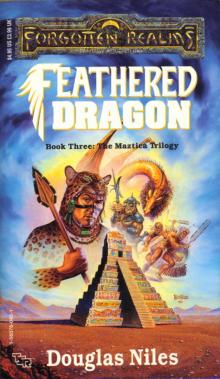 Feathered Dragon mt-3
Feathered Dragon mt-3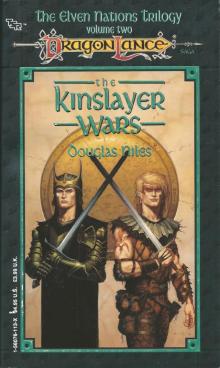 The Kinslayer Wars
The Kinslayer Wars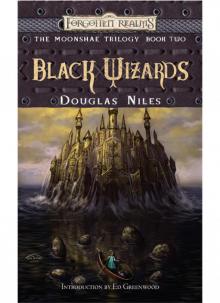 Black Wizards
Black Wizards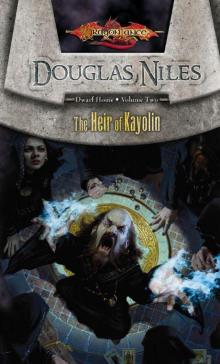 The Heir of Kayolin dh-2
The Heir of Kayolin dh-2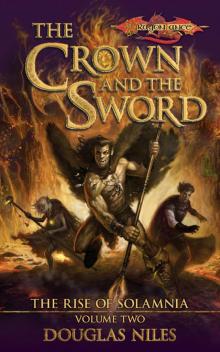 The Crown and the Sword tros-2
The Crown and the Sword tros-2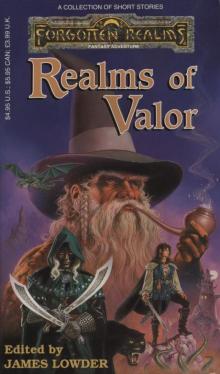 Realms of Valor a-1
Realms of Valor a-1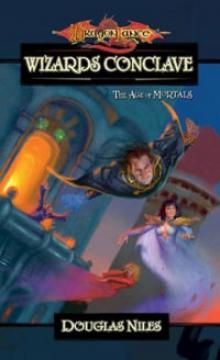 Wizards Conclave aom-5
Wizards Conclave aom-5 Fox On The Rhine
Fox On The Rhine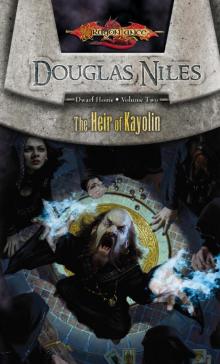 The Heir of Kayolin
The Heir of Kayolin Fox at the Front (Fox on the Rhine)
Fox at the Front (Fox on the Rhine)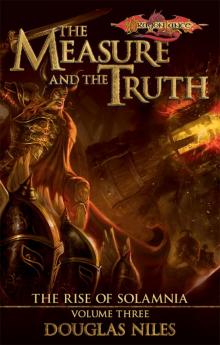 Measure and the Truth tros-3
Measure and the Truth tros-3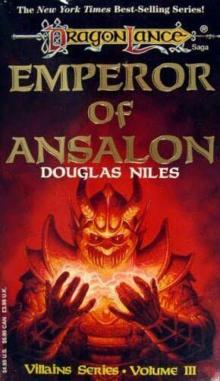 Emperor of Ansalon (d-3)
Emperor of Ansalon (d-3)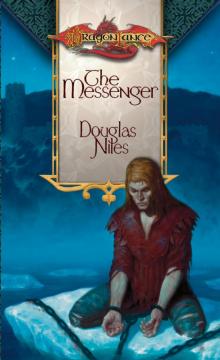 The Messenger it-1
The Messenger it-1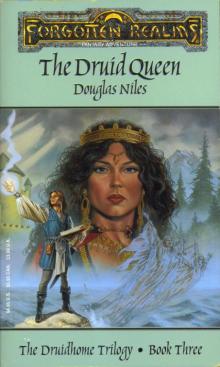 The Druid Queen tdt-3
The Druid Queen tdt-3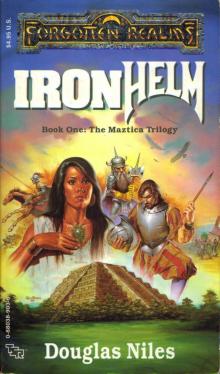 Ironhelm mt-1
Ironhelm mt-1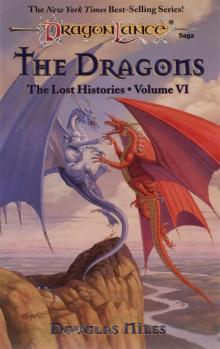 The Dragons lh-6
The Dragons lh-6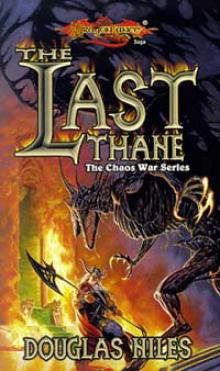 The Last Thane cw-1
The Last Thane cw-1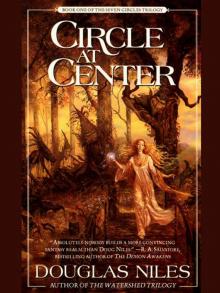 Circle at center sc-1
Circle at center sc-1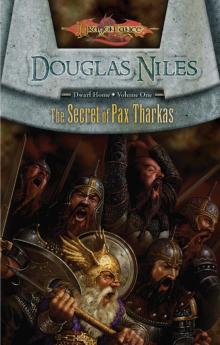 Secret of Pax Tharkas dh-1
Secret of Pax Tharkas dh-1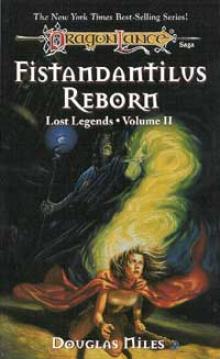 Fistanadantilus Reborn ll-2
Fistanadantilus Reborn ll-2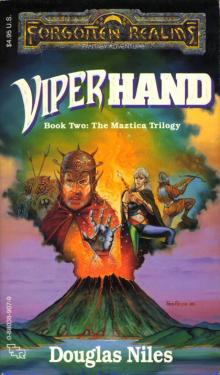 Viperhand mt-2
Viperhand mt-2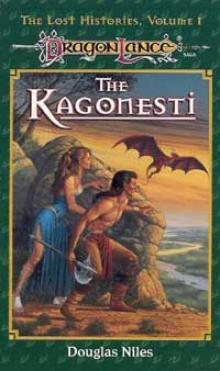 Kagonesti lh-1
Kagonesti lh-1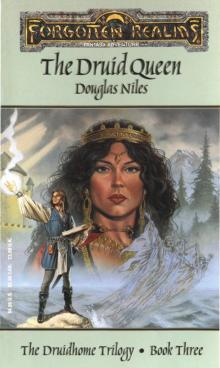 The Druid Queen
The Druid Queen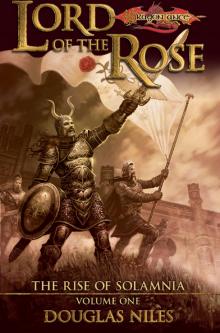 Lord of the Rose tros-1
Lord of the Rose tros-1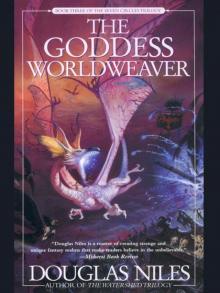 Goddess Worldweaver sc-3
Goddess Worldweaver sc-3 Eyeball to Eyeball (Final Failure)
Eyeball to Eyeball (Final Failure)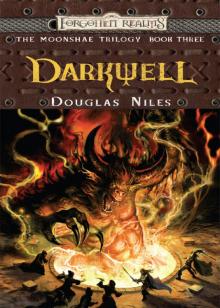 Darkwell
Darkwell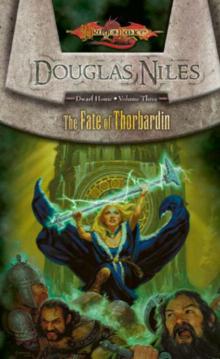 Fate of Thorbardin dh-3
Fate of Thorbardin dh-3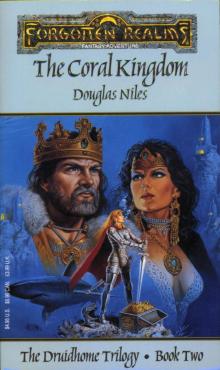 The Coral Kingdom tdt-2
The Coral Kingdom tdt-2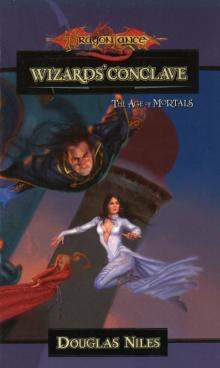 Wizard's Conclave
Wizard's Conclave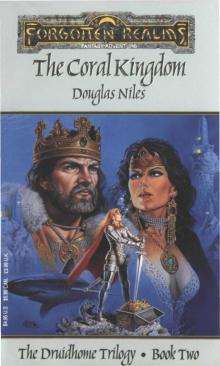 The Coral Kingdom
The Coral Kingdom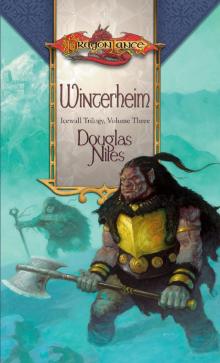 Winterheim it-3
Winterheim it-3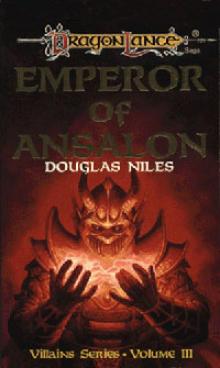 Emperor of Ansalon v-3
Emperor of Ansalon v-3 MacArthur's War: A Novel of the Invasion of Japan
MacArthur's War: A Novel of the Invasion of Japan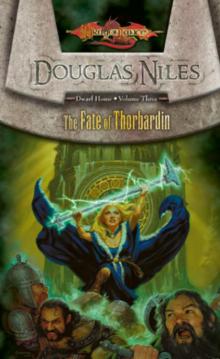 The Fate of Thorbardin
The Fate of Thorbardin The Rod of Seven Parts
The Rod of Seven Parts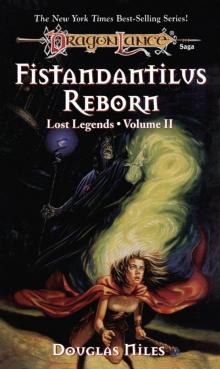 Fistandantilus Reborn
Fistandantilus Reborn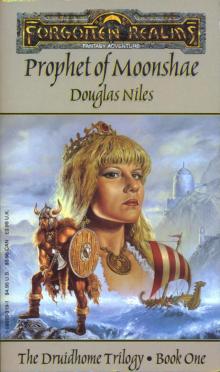 Prophet of Moonshae tdt-1
Prophet of Moonshae tdt-1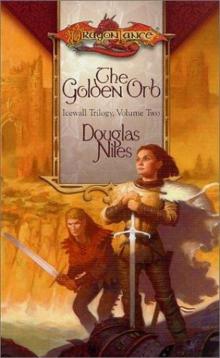 The Golden Orb i-2
The Golden Orb i-2